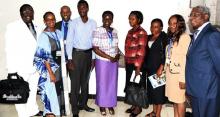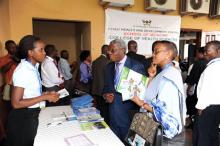Regional Director for Africa calls for Implementation of Universal Infection Control Precautions in Health Facilities
The WHO Regional Director for Africa Dr. Luis Gomes Sambo has called for investment in knowledge and technologies that can deliver proven and cost‐effective interventions to avert the vast majority of health careassociated infections. According to Dr. Sambo, such interventions include implementing system‐wide surveillance, training, education and good communication, appropriate device use, following proper procedures and above all, ensuring optimal hand hygiene practices.
Dr Sambo gave this counsel during the 11th Dr. Mathew Lukwiya Memorial (MLM) lecture delivered on his behalf by the Deputy Regional Director Dr. Matshidiso Moeti. The lecture was held in Kampala recently organized by Uganda National Association of Community and Occupation Health (UNACOH), Makerere University College of Health Sciences with WHO support.
For the proposed interventions to succeed they must be tailored to the reality of each health care setting and most importantly, they require a change of health care workers behavior in all settings.
Dr. Sambo noted with concern the increasing number of health workers who get infected and eventually succumb whenever there is an outbreak in the African region. For instance, during the 2000 Ebola outbreak in Gulu northern Uganda, 31 health workers were infected and 17 of whom, including Dr. Mathew Lukwiya died. During another Ebola outbreak in Bundibugyo, western Uganda, 14 health workers were infected and 5 died including Dr. Jonah Kule. This year, in Kibaale district, 3 health workers were infected and one died. During the Kikwit Ebola outbreak in D.R. Congo in 1995, 47 health workers died, while 23 health workers including 5 deaths are among the over 70 reported Ebola cases in the on‐going outbreak in Isiro health zone of D.R. Congo.
Given that background, Dr. Sambo called for health workers to be trained on universal precautions and how to apply them correctly during patient care in all situations.
According to Dr. Sambo the universal infection control precautions include regular hand washing before and after each patient care intervention; respiratory hygiene; safe injection practices; appropriate waste management; disinfection and sterilization of patient care equipment; use of personal protective equipment including gloves, masks, goggles, and gowns, based on the level of risk; and isolation of infectious patients.
To backup the infection control precautions, Dr. Sambo called for strong and efficient surveillance which is “key to reduction of health‐care associated infections” noting that surveillance does not only point to issues that can be immediately addressed, “it also enables health facilities and public health authorities to understand the magnitude of the problem and what interventions are needed, and to assess their impact”.
Dr. Sambo emphasized the importance of early detection and rapid response to epidemics in reducing chances of further spread of infections, not only in the communities, but also within health care facilities. He listed health worker training; provision of personal protective equipment; triage of patients; education of communities on potential risks as critical components in this regard. “These investments require significant human, material and financial resources. However, these are worthwhile investments, well‐justified by the benefits” he noted.
Dr. Sambo acknowledged the inadequate funding that characterizes many health budgets of African countries and the imbalance between prevention and curative services factors that will make “attainment of the health related MDGs by 2015 and other international targets in global health highly unlikely”.
On the creation of the African Public Health Emergency Fund (APHEF) that was recommended by African Health Ministers during the 59th Session of the Regional Committee, Dr Sambo reported that WHO is in the process of finalizing the administrative measures to operationalize the APHEF, which will provide additional resources for emergency preparedness and response. He also called for inclusion of infection control activities in the funding mechanisms of existing internal and regional partnerships and initiatives such as the Global fund for fight AIDS, TB and Malaria, GAVI and the UNSG’s commitment on the health of Women and Children.
He pledged WHO support to countries to implement the Tunis Declaration on “Value for Money, Sustainability and Accountability in the Health Sector” that was recently adopted by the African Health and Finance Ministers, which calls for action to accelerate the attainment of MDGs through appropriate financing of the health sector. He cautioned that while funding for optimal functioning may be available especially through several financing initiatives, “there is need for transparency, efficiency, effectiveness, and equity in utilization of these funds to enable continued access to essential services”.
For more information please contact :
Benjamin Sensasi, Health Promotion Adviser, WHO Country Office
Tel : 256-41-334400 Email: sensasib [at] ug.afro.who.int



